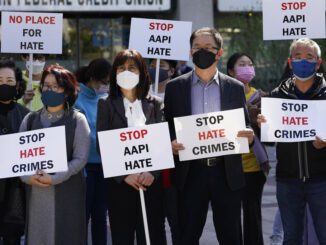Jessica A. Johnson
PULLQUOTE: He simply called for “solidarity” because “we’re all in this together.”
Some very troubling data was released this month from the Stop AAPI Hate (“AAPI” referring to Asian American Pacific Islander) reporting center showing that from March 2020 to March 2021, 6,603 attacks targeting Asians occurred in the U.S.
Resentment toward Asian Americans has been building throughout the pandemic; incendiary political rhetoric, particularly the racist terms “China virus” and “Wuhan virus,” unfurled on social media, branding Asian Americans as responsible for spreading COVID-19. Now we are seeing anti-Asian hate incidents rise across the nation. Two elderly Chinese women were recently stabbed in San Francisco, and six women of Asian descent were killed at an Atlanta spa in March. Stop AAPI Hate findings reveal that California and New York have the highest rates of violence against Asians. Russell Jeung, an Asian American studies professor at San Francisco State University and co-founder of Stop AAPI, has pointed out that the economic hardships resulting from the pandemic, especially in low-income urban areas, has made scapegoats of Asians who live in these communities.
Anti-Asian hate became a topic of discussion toward the end of the spring semester in my TV diversity class at the Ohio State University Lima campus, when we examined Asian portrayal in the former hit ABC sitcom “Fresh Off the Boat.”
We began our analysis a week after the Atlanta shootings, and I felt it was important to explain how Asian Americans have been stereotyped since long before the pandemic. We discussed the “model minority” stereotype that has followed Asian Americans since the late 1960s. When University of California, Berkeley, sociologist William Petersen coined this term, he was specifically referring to Japanese Americans, but the stereotype eventually morphed into a label of all Asian Americans. They are still depicted in pop culture as math and science brainiacs, and as diligent in entrepreneurial pursuits that result in high levels of personal and professional success.
As with all stereotypes, the model minority label is plagued with generalizations since Asians make up many diverse ethnic groups with varied interests. This was shown in a season five episode called “Mo Chinese Mo Problems.” Jessica Huang, the Taiwanese American mother featured in the show, which is set in the ’90s, was upset because the Asian kid in her Orlando, Florida, neighborhood mural was drawn holding a math book. Jessica explains to the white women in her community that a stereotype, even if it is viewed as positive, is still a stereotype that carries negative connotations.
Several of my students wrote outstanding final essays on Asian depiction in media, sharing their perspectives on anti-Asian violence and what they believe can bring us together despite our cultural differences. One focused primarily on music, describing her generation’s fascination with Korean pop singers, known as K-pop artists. This made me reflect on how Korean singers have also embraced another musical genre that crosses racial lines: gospel music.
I am a huge fan of the gospel group Korean Soul, which consists of four talented male vocalists who were discovered by legendary singer BeBe Winans. Before COVID-19 struck, Korean Soul was featured on Winans’ 2019 hit “Laugher Just Like A Medicine,” but it was their recorded performance of Richard Smallwood’s timeless classic “Total Praise” that year that really touched my heart. Onstage at the Christian Cultural Center in Brooklyn, Korean Soul brought the congregation to their feet with a perfect crescendo blending their tenor ranges, singing, “You are the source of my strength/ You are the strength of my life/ I lift my hands in total praise to you/ Amen.” No one was thinking about racial differences in that beautiful moment when they worshipped God on one accord.
As hate incidents against Asians continue to surge across the country, America has to grapple with deep-seated biases against a minority group that has been subtly impacted by racism for many years. Stop AAPI Hate is doing promising work in pushing for the COVID-19 Hate Crimes Act to address issues such as verbal harassment and workplace discrimination. I also have hope in the fight against Asian violence from a recent statement I read from Kevin Park, an associate pastor at Korean Central Presbyterian Church in Atlanta. He simply called for “solidarity” because “we’re all in this together.”
Dr. Jessica A. Johnson is a lecturer in the English department at Ohio State University’s Lima campus.

